By Claire Bacon, ACN, CNC
When you’re young and your hormones are working, everything internally is going your way. You have good energy, you feel good working out, and in short, your body is dependable. If you know when to expect your cycle and it’s easy and pain-free, life is good! But as we get older, things start changing. Our fertility drops and cycles become irregular. This is normal and to be expected, but it’s different for every woman. Unfortunately, the little bit of Sex Ed we received in 7th grade did nothing to prepare us for what’s to come: peri-menopause and eventually menopause.
Without a good understanding of what symptoms may occur in peri-menopause or menopause, sometimes these subtle signs go unnoticed. We may brush off unusual symptoms until they become significant, or until symptoms multiply. Or, we may become confused, not understanding what is happening or what we can do about it. We might even feel like our bodies are not our own. It’s like, one morning we wake up to find we don’t even know what happened to our former selves. And our Moms and even our doctors may not have the best advice for us.
So, if you’re one of those girls who likes to do things “the natural way”, we’ve got lots of information to get you started with understanding your “new” self. Obviously, there’s a lot of nuance when it comes to hormonal issues. That’s why I’m going to summarize all the best info I’ve found to help along your journey. Let’s get to it!
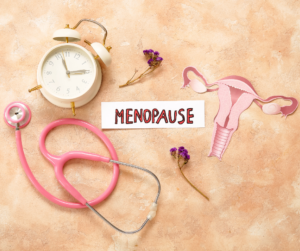
A quick word about PCOS
We have an epidemic of women at very young ages suffering with Polycystic Ovarian Syndrome (PCOS). This condition begins in the cycling years, but often is not diagnosed until we notice problems with irregular cycles, weight gain, and/or difficulty in getting pregnant. Many doctors are not well-trained in recognizing the signs of PCOS, and may blame symptoms on eating improperly, not exercising enough, or just “bad genes”. This is insulting, because nothing could be further from the truth!
PCOS is bad enough when we’re young, but it often gets even worse with peri-menopause (the years roughly between 35-50 when things start changing). It is characterized by a lack of ovulation and impaired hormonal signaling through the hypothalamus and pituitary glands. There is a lack of response from the ovaries and multiple reasons why this could happen. That’s why it’s called a “syndrome”.
PCOS could be caused by emotional trauma or genetics, but is more likely to be caused by endocrine disrupting chemicals affecting the hormone receptors. This may occur with or without insulin resistance (weight gain), ovarian cysts, high testosterone, hirsutism, and/or irregular periods. Common throughout these manifestations are a weak estrogen surge in the follicular phase, irregular ovulation, and a resulting lack of progesterone. The chronic lack of progesterone can lead to mood issues and anxiety. Plus, with the added frustration of inability to lose weight, many PCOS women become depressed and withdrawn socially.
Natural strategies are different for each woman, and must be customized according to her symptoms and lab work.

My Passion and Purpose
Understanding hormonal lab work is a deep passion of mine. Mainly, because my hormones were dysfunctional from the start. From the age of 13 onward, probably 5-6 cycles a year would have me crying in pain, eating Ibuprofen like candy, vomiting, and passing out. I’ve been to the hospital multiple times, had many embarrassing situations, and even missed work as an adult. Not even birth control pills got me out of my misery. And it was not until the age of 34 when I met Dr. Bob that I started my healing journey.

The frustration of looking back…
You see, every GYN that I ever saw growing up had the same typical playbook. No one thought outside the box, and no one had time to discuss anything about my diet or lifestyle that might point to my underlying issues. Their solution? Take copious amounts of Advil starting 3 days before my cycle and drink Gatorade. 🙁 As Dr. Bob and dated and eventually got married, he slowly but surely opened my eyes to the Chiropractic lifestyle and a different way of life. He changed my diet and removed pharmaceuticals from my medicine cabinet. Best of all, he took me to his Chiropractic and Nutrition Continuing Ed seminars, where I found “my people” and “my answers”.
For 20 years, I had been asking every GYN, GP, and even an Endocrinologist what was wrong with my hormones. I asked if we could test them? No one ever did. No one referred me to someone who could help. Everyone said, “we don’t know why, hormones are a mystery.”
Finding hope…
So, when I found out at a Standard Process seminar that I could test my hormones and put everything on paper – I was overjoyed! I would have paid anything to do that test! Whatever it took. And so, as I learned what the results meant, and treated myself naturally, and retested and checked for improvements, I discovered healing and a new love that would develop into a new career. And my specialty would soon become helping women navigate peri-menopause and menopause.
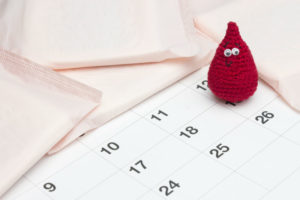
For the next 10+ years, I enjoyed being the master of my hormones. It was a continual challenge, but I was always making progress in my understanding and ways to apply my new knowledge of herbs and supplements. Then it all changed again as I approached 50. Although I had felt that I would be immune to the unwanted symptoms of menopause, here they were… hot flashes and night sweats showed up with a vengeance! And that sent me right back to the drawing board, and a new set of lab testing began…
Lab Work and Understanding What Is Happening
I cannot stress this enough: You can’t guess at what is going on with your hormones. You have to test. We can get a good idea and make some progress just by listening to your symptoms and starting on some initial supplements. But at some point, you’re going to have to invest in yourself and get some good objective data.
There have definitely been times that I have been surprised by what I saw on someone’s test results as they came in. Sometimes you feel so sure that some high/low hormone must be the underlying problem. But then you see that “no, it’s not!” And you have to go another direction. You owe it to yourself to find out what’s really up with you.
Here’s the complication in peri-menopause: it is normal and expected to be riding a roller coaster of fluctuating hormones. That’s just the way it is for a few years until your hormones settle down. But we can definitely help you feel better along the way! Usually, we would expect this to be a time of inadequate progesterone production.
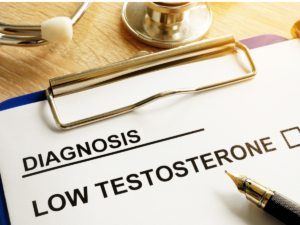
Exp. FHP
For a young, cycling woman who is having trouble with her periods or trying to get pregnant, we recommend the Diagnostechs expanded Female Hormone Panel. This is a saliva test that maps out the variations in Estrogen and Progesterone all month long, with an average value of Testosterone and DHEA, plus FSH and LH.
Sometimes this test is helpful in peri-menopause, when you’re not so sure what might be going on. One month your cycle might be right on time; whereas the next month could be 40+ days. We want to map the cycle that is dysfunctional. It’s totally possible that you have one ovary still functioning well, with the other one starting to falter. In this way, we can see exactly what part of the cycle needs to be supported.
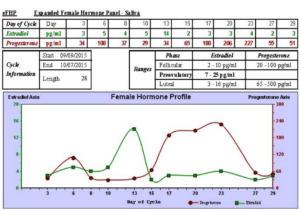
DUTCH
For older ladies, especially if you’re not trying to get pregnant, we recommend the DUTCH Complete (dried urine) test. It’s the best for understanding what may be going on at the beginning of menopause because it is so comprehensive. We get to see 3 different forms of estrogen, progesterone, testosterone, and it’s hair-destroying metabolite, DHT. Plus, we get a look at the adrenal hormones, Cortisol and DHEA-S. And we can check Melatonin to see if that’s the cause of your sleep issues. In addition, the included organic acid testing looks at vitamin B6, B12, gut dysbiosis, glutathione, dopamine, adrenaline, and oxidative stress. But the best part of it is the 3 liver detox pathways: 2-OH, 4-OH, and 16-OH and whether you’re “methylating” or detoxing well. This helps us understand whether your liver is congested and needs prime time attention before doing anything else with your hormones.
Personally, I have done a lot of training on how to interpret the DUTCH test. I know some doctors don’t like this test. I assume it’s because they haven’t had time to learn all the nuances. However, I have had some wonderful mentors who taught me the deep insight of using this test. It is most helpful in menopause, but could be useful in peri-menopause if you can time it right. The main benefit is to understand your liver detox pathways.
Once we have a good baseline with the DUTCH Complete, the next time we want to follow up on your estrogen, progesterone, and testosterone we can do the abbreviated DUTCH Sex Hormones test. This is also a dried urine test, and is much less expensive. It is good for a spot check of your sex hormones and the detox pathways. It’s good if we’re not curious about the adrenal markers and organic acids.
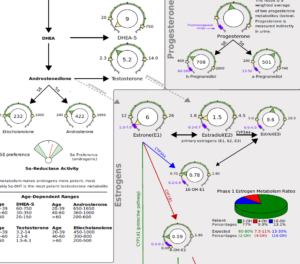
Bloodwork
Of course, the typical way most women are used to getting hormones checked is in the blood. However, this has limitations. Blood testing is essential if we’re curious about anemia, sugar handling issues, and thyroid problems. We also need blood to look for certain mineral deficiencies, for evidence of autoimmunity, and for Sex Hormone Binding Globulin.
If we want to look at your sex hormones (E, P, T) in the blood, we have to consider this a “quick and dirty” method to get some cheap info that may or may not be helpful. Hormones in the blood are bound to proteins, and some of what’s found in the test is not fully available to the cells. So, a normal result might be misleading and you might actually be low. For a cycling woman in peri-menopause, we may like to catch the “progesterone peak” around Day 19-21. Otherwise, in menopause any day is just as good as another.
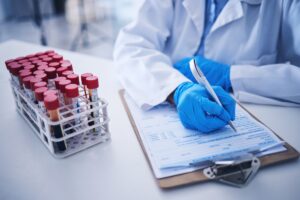
Menopause, Exercise, and Protein
As we get older, we naturally become more insulin resistant. Especially if we also have a thyroid issue and low muscle mass, our newfound insulin resistance can cause major weight gain. This can be so confusing to realize that the diet and exercise tactics we used in our twenties no longer work for us. We cannot starve ourselves and do more on the elliptical – it just won’t work.
In peri-menopause, this is just about the end of our ideal time to build good bone density. Once we transition to menopause, most of our work is spent to maintain the bone density we already have.
That’s because proper hormone levels keep our insulin receptors sensitive and keep our muscles and joints fully functional. Hormones make it easier to build and maintain muscle mass, and lubricate our joints. In short, hormones keep us feeling good and looking good in the gym. It’s true, a lack of estrogen is a major driver of frozen shoulder. In my opinion, you can’t recover a frozen shoulder without estrogen.
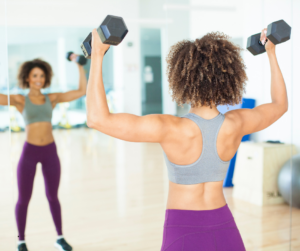
The need for muscle building and higher protein
One point that I really want to make loud and clear is that your muscles run your metabolism. As Dr. Gabrielle Lyon says:
You need protein for the structure, metabolic function, and regulation of all tissues and organs, including muscle. Every cell in your body is full of enzymes, which are proteins that control your metabolism. Protein is also important for neurotransmitters, which are responsible for mood and even your sleep. Your bones, your ligaments, your tendons, your liver, your brain, skin, and fingernails are all built from proteins.
So, one thing we need to do as menopausal women is to increase our protein. Maybe we are used to letting our husbands have the majority of the meat, but we really need to claim our fair share. The goal should be 0.7-1.0 gram of protein per pound of ideal body weight. That’s about 100 grams of protein for most of us. If we consider having 25 grams of protein at breakfast, 35 grams at lunch, and 40 grams at dinner, that’s probably way more than we’re used to consuming!
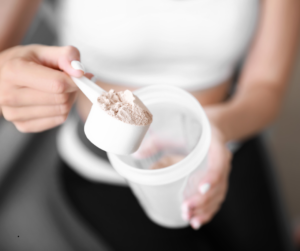
Of course, we want to make sure we can digest all this protein. If you find yourself very gassy or bloated, it’s worth trying a hydrochloric acid supplement like Zypan or adding 2-3 tsp apple cider vinegar to your water with meals.

Lifting weights in menopause
The other thing we must do is exercise to build our muscles. We need to lift weights like we’ve never lifted before. Because our muscle is what protects us when we fall. The stress of training is what stimulates our bones. We want elasticity and strength in our bones, and that’s why we have to apply the external stress of lifting weights. When we were younger, our high hormone levels stimulated our bones. But not anymore. We have to do the work. There’s just no way around it!
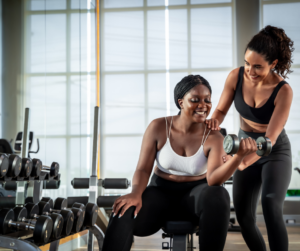
Highlights on Menopause – What You Need to Know
Every woman goes through menopause – with over 80% having life-changing symptoms.
This doesn’t have to be you! With the right information, you can keep your sleep, energy, weight, bones, and brain power right on track. Menopause is not a taboo topic like it was for our Mom’s and Grandma’s generations. Now, we can talk about these things with our friends and trusted doctors. We can learn from each other – and we’ll all be healthier for it!
Hormones do not cause breast cancer.
It is normal for cells in the breast to have receptors for estrogen and progesterone. When a breast tumor cell retains the receptors for estrogen and/or progesterone, that shows the cell has not completely given up its normal architecture to the cancer. With some cancers, it is beneficial to change the tumor environment and temporarily block that hormone production during treatment and recovery. But it does not mean the hormone caused the cancer. And it doesn’t mean you can never have normal hormone levels again.
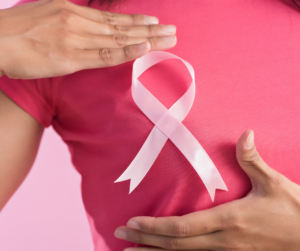
Depression and anxiety are common symptoms of low hormones.
Don’t be so fast to jump to an antidepressant. Anti-anxiety and anti-depressant drugs carry their own risks of nutritional deficiencies and sexual side effects, and do nothing to fix the actual problem if your estrogen, progesterone, and testosterone are low.
This is another reason why I love the DUTCH Complete, as it shows your Dopamine and Adrenaline neurotransmitters. If Dopamine is low, that will directly affect your mood. It’s a prime reason why we love supporting the full endocrine system and specifically love adding in L-Tyrosine – especially if the thyroid needs a lift, too!
Vaginal dryness can progress to serious atrophy and autoimmunity.
The initial aggravation of vaginal dryness might not be that bad. After all, you can use some silicone-based lube and avoid the problem. However, what the vagina really wants is estrogen. Everything from the cervix to the vaginal walls, bladder, vulva, labia, and clitoris all LOVE estrogen. Having adequate estrogen protects the integrity of your skin, and plumps and moistens the tissues so they are happy and healthy. Additional benefits can come from using progesterone, DHEA, and hyaluronic acid, too. (I recommend this one, which pairs with the Joylux vFit Gold+ red light therapy device).
Sex is not all we care about. Even if you’re not sexually active, your vagina needs some loving attention. Without protective lubrication and hormones, the tissues can shrink and tighten. The skin can become thin and tear easily. Autoimmunity in the form of Lichen Sclerosis could start. The labia could shrivel and turn purple. And the hood of the clitoris could adhere or essentially become stuck on the surrounding tissue, causing constant pain. The most common problem could be an increased likelihood of recurrent yeast infections and urinary tract infections. Think about all the old ladies in nursing homes who are chronically suffering with UTIs. Guaranteed they are missing out on vaginal estrogen! 🙁
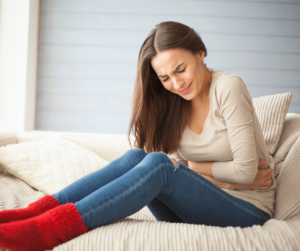
These things can happen even if you’re not that old! That’s why we like recommending the Bezwecken vaginal inserts:
- Hydration Ovals 2x with Estriol
- Hydration Ovals 2x Plus with Estriol and DHEA
- EP Ovals with Estriol and Progesterone
- PG Ovals with Progesterone (good if you already have a vaginal estrogen tablet or cream)
I’m telling you, you’ve got to have an eye out for your vaginal health in order to prevent these serious issues!
Every woman is a candidate for vaginal estrogen.
Current research shows that using vaginal estrogen does not raise systemic (blood) estrogen levels, and does not increase risk of breast cancer. Essentially, the vaginal tissues love estrogen so much that they suck it all up and hold it right there. Therefore, every woman can feel free to use vaginal estrogen to relieve their symptoms and restore good skin integrity and an optimal pH.
We recommend using a vaginal estrogen oval (above) or prescription tablet from your doctor to support the deep vaginal & cervical tissues. You’ll also want a cream or gel to use as skin care on the vulva, labia, and clitoris.
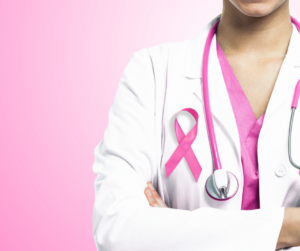
Bioidentical hormone replacement is much safer than most women realize.
Bioidentical hormones are not the same as synthetic birth control pills. What’s in your old bcp is progestin – not progesterone. If your doctor is offering you birth control pills in your 50s – he or she is not properly trained in menopause management.
The reason everyone got so scared of using hormones is because of a premature media release of a misinterpretation of the Women’s Health Initiative (WHI) study from 2002. The media ran with an incorrect headline that estrogen caused cancer in a large, government-funded study. It’s a long story to explain all where all the lies and exaggerations came from. You’ll want to read Dr. Lindsey Berkson’s Estrogen Vindication Part 1 , Part 2, and Part 3 documents. But now that the study has been rereviewed, and certain key points have been walked back, now we know that hormones are safe for most women. Dosage and mode of delivery can be tailored to personal health and individual preferences.
Boosting Your Hormones Naturally…
The first step we recommend after you do testing is to support your endocrine system with a personalized supplement protocol. In this way, we can try to coax a more robust hormonal output from your own glandular system. It’s the safest way we can help you feel better, as you will never overdose yourself with your own hormone production. With our nutritional training, we can offer you a personalized supplement protocol to uplift functions of your hypothalamus, pituitary, and ovaries. And if necessary, your adrenals, thyroid, and digestive system, too!
There is no limit to how much better you can feel when you are properly supported. We use glandular extracts, food concentrates, and a vast array of herbal preparations to optimize your endocrine function. We have wonderful non-hormonal options for you to explore. And if you find that conservative methods are not enough, you can always move forward later to something stronger with the satisfaction that you built a good foundation for health naturally.
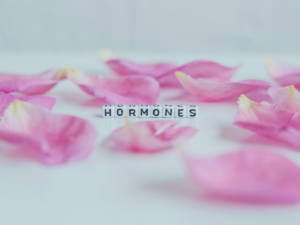
Best Supplements for a Healthy Start
Our most foundational combination to help women of all ages would be: Hypothalmex with Symplex F and Evening Primrose Oil.
As long as we’re not dealing with terrible cramps and spasmodic dysmenorrhea, Chaste Tree (Vitex)is a wonderful herb that supports pituitary function to normalize progesterone and prolactin, which can help resolve many menstrual concerns. It works nicely with Utrophin PMG when we’d like better uterine function.
When progesterone starts dipping low, we’ll often choose Ovex-P, maybe with Wild Yam Complex to support the ovaries in building more P.
If stress and anxiety have gotten the best of you, Adrenal Desiccated with Ashwagandha Complex is a wonderful combo.
If high testosterone from PCOS is complicating the mix, we might want to add Berberine HCl or our White Peony and Licorice herbal tonic.
When menopause starts interfering with sleep, adding the calming B vitamins from Cataplex B2 with Valerian Complex can restore a good night’s rest.
We are really excited about two new products from Orthomolecular: Rhubestryn as a source of Rhubarb for natural hormone balance and InosiCare for myo-inositol and d-chiro-inositol to help with sugar handling! Available in office only.
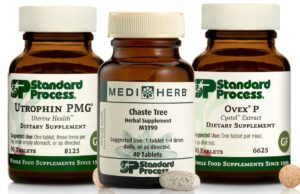
Liver Cleansing for Balanced Hormones
And of course, you can’t get your hormones right if you don’t get your liver right. A liver cleanse is one of the best things you can do for yourself, and it’s often our first strategy in trying to balance hormones naturally. It’s an easy and effective way to make ALL of the body’s systems work better. And that’s especially important if you’re trying to lose weight. Cleansing your liver is the best way to remove stubborn obesogen chemicals we’re exposed to every day.
That’s why we invite everyone in our practice – especially women in peri-menopause and menopause – to join in our Group Cleanse every January! We’ll have another group opportunity later this summer, too. Contact Traci at our front desk if you’d like to sign up.
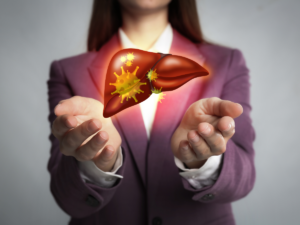
The fastest way to feel better is to make an appointment today!
Favorite Menopause and Peri-Menopause Books
If you love reading, you might as well start with some of these deep dives into female hormones…
| Estrogen Matters by Avrum Bluming, MD and Carol Tavris, PhD |
| The ebook Safe Hormones, Smart Women and the paperback Sexy Brain – both by Dr. Lindsey Berkson |
| The New Menopause by Dr. Mary Claire Haver |
| The Hormone Repair Manual by Lara Briden, ND |
| The Smart Woman’s Guide to Breast Cancer by Dr. Jenn Simmons |

Favorite Menopause and Female Hormone Podcasts
If you are in the car often, you might as well use the time as a learning opportunity. Here are some of my favorite podcast hosts and links to their shows or featured episodes…
| Lindsey Berkson, DC is the OG on female hormone health. This episode is on “the great estrogen debate”. | Anna Cabeca, MD is the “Girlfriend Doctor” with a wonderful DHEA product – Julva (for the vulva) | Mary Claire Haver, MD is the leading voice of menopausal hormones and is a frequent guest host. I love her conversation with Mel Robbins. |
| Lisa Mosconi, PhD expert on the role of estrogen on brain health and preventing cognitive decline | Kelly Casperson, MD is a urologist with a special interest in sexual health. Direct and to the point! | Stacy Sims, PhD is an exercise physiologist and expert on optimizing females’ athletic potential |
| Cynthia Thurlow, NP takes a very careful approach in explaining all aspects of female wellness | Thais Aliabadi, MD specializes in female hormone concerns – especially PCOS. Designed the Ovii supplement as a foundational support. | Tyna Moore, ND, DC is the leading voice on microdosing GLP-1 peptides, and the use of other peptides for health optimization |
| Stephanie Estima, DC is a Canadian chiropractor who explores all aspects of biohacking and women’s health | Amie Hornaman, DCN specializes in optimizing thyroid hormones, but acknowledges thyroid is intertwined with E, P, and T as well. | Karen Martell hosts many doctors on her show and explores topics that are easy for regular women to understand. |

Personalized Consults for Peri- and Post-Menopause
We know it can be hard to figure it all out yourself, and you don’t need to gain a doctorate degree just to take care of your own health! That’s what we’re here for – to help you navigate the ins and outs of testing, with personalized recommendations for diet, exercise, supplements, and maybe a start on some bioidentical hormones.
We’re here to listen with compassion, and to guide you to the best form of action for you. And if your needs are beyond what we can give (i.e. testosterone or thyroid hormones) we’re happy to recommend our favorite local medical doctors who can help you.
Give yourself the best chance for navigating menopause with ease – call for an appointment today! We see clients in our Marietta, GA office and also do virtual consults for our long-distance clients. We’re happy to help!



